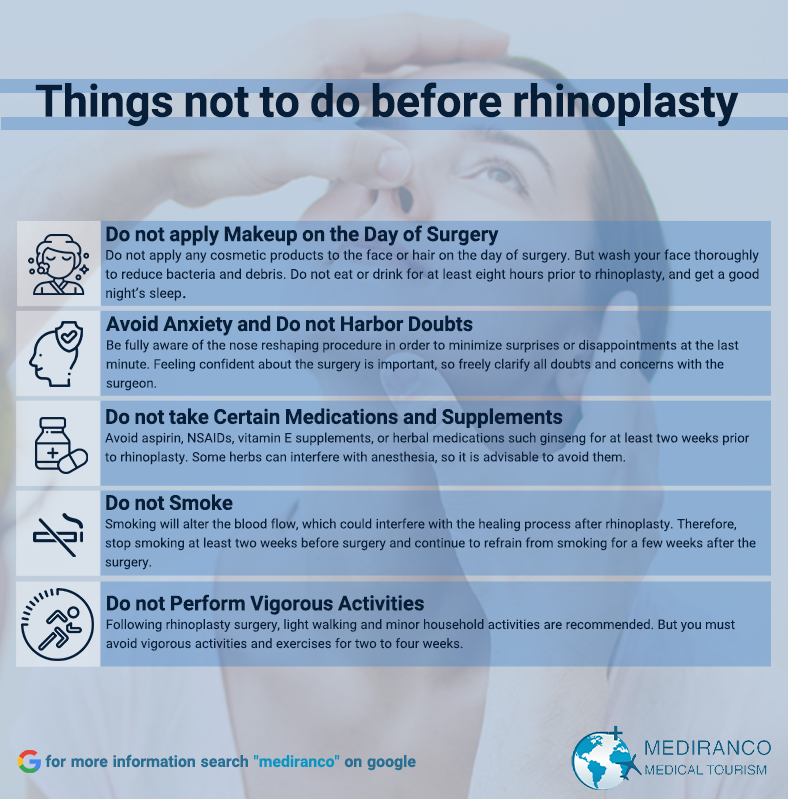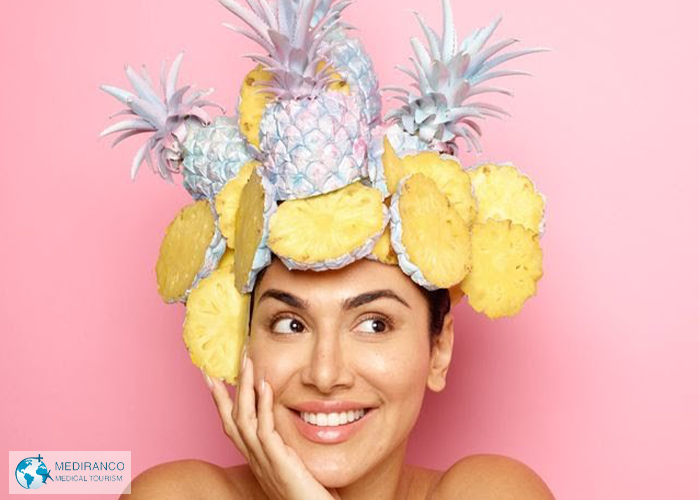What food should I eat or avoid before rhinoplasty? Rhinoplasty does not just terminate to the surgery room and the surgeon’s work in the operating room. To have a successful nose job, you should be taking steps a few weeks before the surgery and after consultation with the doctor to not face the problem on the day of surgery. However, after the surgery, you must be careful with diet and activities for having a good result and reach without any problem to your ideal form and beauty.
The preoperative rhinoplasty (two to four weeks before surgery) is a very convenient time to ensure you meet your needs for a healthy lifestyle and prepare for surgical stress. In the following, we provided some nutrients that are essential during this period.
The main concern to most patients is what to eat before rhinoplasty? What foods are prohibited, and what foods are better to consume? What to avoid before rhinoplasty? We will talk about the essential points of diet before rhinoplasty, like consumption of soft drinks, coffee, multivitamins, alcohol, milk, pineapple, celery juice, bananas, pills, salt, chewing food before, and rhinoplasty.
Table of Contents
ToggleFoods to eat before cosmetic surgery
In some cases, it is necessary to have a special diet from a few days or even a few weeks before surgery. However, every action requires a special diet, Gastrointestinal surgery, for example, requires special nutrition, which your doctor should advise. However, it is generally recommended that you avoid heavy foods the night before surgery. Eat healthy foods rich in vitamins and minerals.
In this case, the possibility of side effects is minimized and the recovery process will be faster. The results of a study show that having a low-fat diet (from a few weeks before surgery) reduces the severity of surgical side effects, because adipose tissue has a great effect on the occurrence of inflammation in the body.
What should I eat before rhinoplasty?
It is better to control your diet three or four weeks before the cosmetic surgery, to accustom yourself to a healthy way of eating. The nutrients that are useful to eat before rhinoplasty, we will introduce:
1. Protein:
protein is a fundamental nutrient for the creation of new blood cells and collagen. Building collagen is necessary for the skin, muscles, tendons, and bones – all parts that need healing after rhinoplasty.
Protein intake is vital to having a secure immune system. Women should consume 1.2 grams of protein per kilogram of body weight every day. It means that a woman 120 pounds (equivalent to 54 kg) should consume about 65 grams of protein daily.
The protein required by men is commonly estimated as 1.5 grams of protein per kilogram of body weight per day. For example, a man 150 pounds (equivalent to 68 kg) should consume about 102 grams of protein daily. Foods such as fish, eggs, chicken, turkey, beef, low-fat yogurt, nuts, quinoa, and all kinds of beans are all good sources of protein.
2. Fruits and vegetables:
Eat fruits and vegetables that are rich in vitamin A, vitamin C, selenium, and manganese. These nutrients fight what is known as free radicals. Free radicals as a natural reaction in times of stress (such as surgery) appear in your body and may cause tissue damage, and slow the recovery process.
You will find Vitamin A in cabbage, spinach, and vitamin C in Citrus and green pepper. Mushrooms, cabbage, and spinach contain enough selenium. Raspberries, pineapples, and bananas are all great sources of manganese.
Spinach is one of the most useful foods that any of us can include in our preoperative rhinoplasty diet, and it will be worth more before surgery.
Also, having vitamins A, B2, B6, K, and contains large amounts of iron, which can increase blood volume and help reduce recovery time.
A plate of beans is a rich source of protein that can control blood sugar levels and energy. Certainly, taking it in the last days before rhinoplasty can be helpful. Beans are an excellent source of fiber as well, which can help prevent postoperative constipation.
Beet the purple fruit that is often used in the salad provides a lot of useful nutrients, including the amino acid, L-glutamine that, with the improvement of nitrogen balance and improvement of lymphocytes can reduce the recovery time, and really tastes good too!
In general, if you eat a variety of colorful fruits and vegetables daily, you can be sure that you will get the nutrients you need. However, eating all fruits and vegetables before cosmetic surgery necessarily is not useful, and must be avoided to take some of them, which is a continuation of the article.
3. Water:
Drink at least 2 liters of water daily. Consuming 2.5 to 3 liters is even better.

How much pineapple should I eat before surgery, and why?

A surprising suggestion that doctors often recommend taking pineapple in the days leading up to surgery. Pineapple contains bromelain, which is a powerful enzyme with useful properties. Bromelain also helps relieve nausea and even fights nasal congestion. Consult your doctor before starting taking pineapple before surgery. Consumption of this fruit is beneficial in almost all safe conditions, but the doctor should confirm that it is suitable for you. The doctor can also suggest how much pineapple to eat before surgery to ensure the best results.
Taking vitamins before rhinoplasty
You should have an optimal level of vitamins before surgery, but do not overuse vitamins. The only vitamin that you should consume more before the procedure is vitamin C. At least a week before surgery, absorb daily vitamin C, because vitamin C is useful for faster recovery after surgery, and healing of wounds. Also, there are vitamins to avoid before surgery for example: large amounts of vitamin E (more than 400 mg per day) can cause bruising and bleeding to increase. Be careful in taking any homeopathic supplements. Many supplements increase bruising and bleeding. Their consumption is beneficial to your health but may interfere with surgery. Especially herbal remedies are very high-risk. Often, these substances have not been examined and can increase bruising and bleeding.
Is it ok to drink coffee after rhinoplasty?
What are the problems of eating caffeine after rhinoplasty? When can you start drinking coffee after rhinoplasty or drinking tea after rhinoplasty? How Much Caffeine Does Green Tea Have? In general, alcoholic and caffeinated beverages such as tea, coffee, energy or carbonated beverages, chocolate, hot chocolate are blood thinners. Therefore, they increase the risk of bleeding and swelling after rhinoplasty. Caffeine can also raise blood pressure, which can cause a hematoma (blood clot) under the skin of the nose.
When can you start consuming caffeine after rhinoplasty?
It is true that caffeine reduces pain, but you should not consume any caffeine from one week before surgery and one week after nasal surgery. It is best to avoid caffeine for up to a month after rhinoplasty.
What to avoid eating before rhinoplasty?
Before surgery, you should avoid eating foods that cause increased blood pressure and weaken the immune system. We have mentioned the most important of them:
About a week before surgery all the vitamin and herbal supplements, Omega 3 capsules, and also ginger, green tea, flaxseed, cayenne, eggplant, garlic, tomatoes, and potatoes must be avoided because
Maybe many of them cause blood clotting disorder.
Alcohol, caffeine, and artificial sweeteners should also be completely prohibited. Avoid taking any type of vitamin containing vitamin C, Vitamin E, Vitamin B, vitamin K, and fish oil.
Even if you do not have a special food allergy, you should refrain from consuming any allergen foods before rhinoplasty. Some allergen foods include:
- Peanuts
- Eggs
- Nuts and dried fruits
- Milk
- Fish and oysters
- Soy or wheat products
However, you can restart your typical diet after surgery. It is merely a precautionary recommendation.
Some foods may harm blood circulation and slow the recovery or disruption of the anesthesia process. These foods include:
- Chili
- Green tea
- Flax seeds
- Tomatoes
- Garlic
- Potatoes
- Eggplant
More suggestions about What food should you eat or avoid before rhinoplasty?
At least 24 hours before rhinoplasty, you should refrain from consuming foods that contain high fiber. These ingredients include fruits and vegetables. Because high-fiber foods have longer digestion, especially apples, raspberries, oranges, and pears. Vegetables such as broccoli, peas, and artichokes also have a lot of fiber.
Avoid consuming fiber-filled foods such as pasta with whole wheat, oatmeal, whole grain bread, beans, and lentils. This diet is called a low-bacteria or low-fiber diet.
The night before rhinoplasty, you need to drink soft drinks, which you can see from the inside of them on the other side of the glass. These drinks include water, lemon soda, and apple juice. Your body will quickly digest these drinks until the digestive tract becomes cleaned for rhinoplasty.
Refrain from consuming pulpy juices, coffee with cream, soda, and milk. The pulp contains fiber, which is difficult to break down for your body. Also, fatty dairy drinks need a longer time to digest and stay in your body for a while.
Food plays a significant role in the healing and recovery process, and perfect results require a dedication to health that starts long before the first consultation. A pre-and post-op dietary game plan – alone or with help from a coach or meal service – can optimize the body’s healing powers and help a patient recover comfortably. In conclusion, If patients don’t have a healthy lifestyle with quality eating habits, they will not be able to maintain results.

